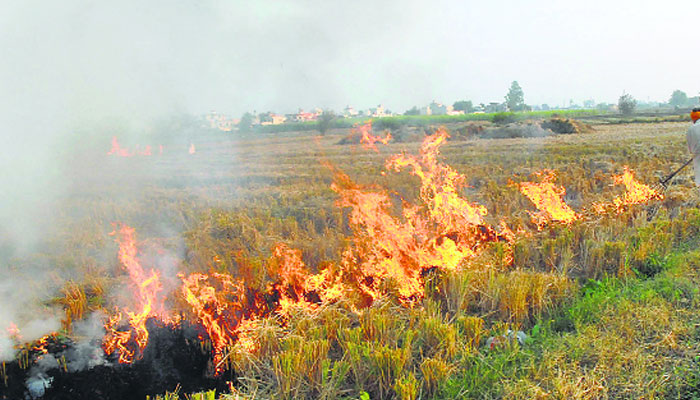TRENDING TAGS :
Stubble-burning in Punjab, Haryana: Few options for farmers
Chandigarh: With the central and state governments, and even the National Green Tribunal (NGT), coming down heavily on stubble-burning in Punjab and Haryana, farmers in both the states say they have few options available to avoid burning the crop residue.
With a bumper paddy crop expected in the two agrarian states this kharif season -- likely in excess of 22.5 million tonnes -- the crop residue that will be burnt by farmers to prepare their land for the next crop sowing will be phenomenal. Punjab is expecting to procure over 18 million tonnes of paddy this season.
The central and state governments, in recent years, have tried several steps -- from warning farmers to registering cases against them to creating awareness on stubble-burning, but nothing seems to be working. The burning of the crop residue, leading to pollution and even smog over northern India in the winter months, has serious health implications for the people.
Also Read: Rahul Gandhi seeks reply from PM Modi over Jay Shah episode
"Most farmers are not well off. They cannot adopt the scientific and technological methods being suggested as it costs money. They have no option but to burn the residue to clear their agricultural fields and be ready for sowing the next crop," farmer Gurmel Singh of Fatehgarh Sahib district told IANS.
Punjab Chief Minister Amarinder Singh has ruled out confronting the farmers on the issue, saying his government "would not add to the financial burden of the beleaguered farmers, many of whom are committing suicide due to economic hardship".
"While we are committed to environmental protection, we would not pressurise the farmers in the process of implementing the ban on burning of paddy residue. There is no question of penalising the farmers, who can barely make both ends meet," Amarinder said, adding that the law and order machinery was not adequate to solve the problem, which required collective efforts by the central and state governments for a meaningful resolution.
The Punjab government has asked the union ministries of finance and agriculture to compensate the farmers at Rs 100 per quintal, over and above the MSP (minimum support price for crop) to dissuade them from burning the stubble.
You may also Read: Godhra riots | Gujarat HC commutes death sentences to lifer
"Though there is a lot of talk of machines that could manage stubble in the fields, those are futuristic plans which do not resolve the immediate problem," the Chief Minister pointed out, adding that the problem was of gigantic proportions in Punjab, where almost one farmer's death was being reported every day due to financial issues.
"Green Revolution" state Punjab, with just 1.54 per cent of the country's geographical area, contributes 50 per cent of foodgrain (wheat and paddy) to the national kitty.
As per Punjab government estimates, there are over 1.75 million farmers in the state, which has a population of 28 million.
"With 75 per cent of the 19.7 million tonnes of paddy straw generated in Punjab every year, the problem has assumed dangerous proportions, leading to loss of organic material for soil, degradation of air quality and high SPM levels. Of the total paddy straw, only 21.8 per cent is consumed in biomass-based projects, paper/cardboard mills and animal fodder/other uses, while a small portion is managed through other systems such as machinery and equipment," a recent Punjab government report had pointed out.
Punjab's Science and Technology Department has suggested managing the remaining 15.40 million tonnes per year of paddy residue through crop diversification, straw management equipment and industrial use. But all these steps require significant investment.
At the same time, the Punjab government has taken several steps to strengthen the legal framework to control the problem. The state had, in 2013, issued orders under Section 19(5) of the Air Act, 1981, banning the burning of all kinds of crop residue. All Deputy Commissioners have issued orders banning the burning of wheat straw and other residue in their districts.
Village panchayats have also been directed to pass resolutions that crop residue will not be burnt and in case of violation the person would not be eligible for auction of panchayat land the following year.
A major campaign has also been launched to create awareness among the farmers about the ill-effects of stubble-burning.
Take a look at: No firecrackers for Delhi-National Capital Region: Supreme Court
Steps are also being taken to monitor instances of stubble burning, with the Punjab Pollution Control Board (PPCB) engaging the Punjab Remote Sensing Centre, Ludhiana, to deliver real-time information about fire incidents.
During the wheat harvesting season earlier this year, Rs 61.47 lakh in fines was imposed on farmers involved in 10,905 incidents of stubble-burning. The money is yet to be recovered from the erring farmers.
In neighbouring Haryana, Chief Secretary D.S. Dhesi has directed officers to run a special campaign to generate awareness among the people against burning crop stubble -- and deal strictly with those found doing so.
Dhesi said that, for the first time, assistance of sarpanches of gram panchayats would be sought to make people aware about the disadvantages of burning crop stubble, and they would be made answerable.
--IANS



